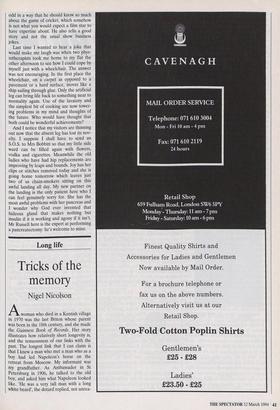Long life
Tricks of the memory
Nigel Nicolson
sonably, as he had seen the Emperor only from ground-level, and the frost may have whitened his podgy features and the upper part of his greatcoat. Still, it does indicate the unreliability of oral evidence compared to documentary. A man of 104 is not remembering what happened when he was a boy: he is remembering what he remem- bered of it when he was 40, then 70. The plate has too often been exposed on his mind for the image to remain sharp.
Links with the past fail to impress our descendants as much as we would wish. I paid little attention when my father described how he had run alongside Queen Victoria's carriage when he was a boy at Wellington, and I did not quite believe his story of meeting Arthur Nicholls, husband of Charlotte Bronte, in 1904, and how the old clergyman had described his marriage as idyllic. Similarly, my children are unim- pressed when I tell them that Michael Hes- eltine's first political function was to canvass for me at a by-election in 1952, and how I gazed into Churchill's eyes when I took my seat. Dropping historic names is uninteresting and suspect. So you met Robert Bridges, Ramsay MacDonald and Baldwin — so what? This has not prevent- ed me from shaping their own links. I took them to see Churchill lying in state in Westminster Hall in 1965. 'Never forget this,' I said. And there was the dawn of 21 July 1969 when, huddled in dressing-gowns, we watched Neil Armstrong perform his ghostly ballet on the moon.
One discovers the fallibility of memory when one revisits a place after a long inter- val. The preparatory school that seemed enormous to a boy shrinks to toy-like dimensions as an adult. I could have sworn that my bedroom in our first house entered directly into my mother's: now I find that there was an intervening passage. I have often told a story about Lady Ottoline Morrell's visit, when I was brought down to make a 14th at lunch (people were very superstitious in those days), and asked my mother during an unfortunate pause in the conversation, 'Is that lady a witch?', but now I know that Lady Ottoline could not have been there on that occasion because she was in Italy. Never mind, one says when caught out, the story is true intrinsi- cally, when of course it isn't. It is designed solely to make me sound bright as a child, or charmingly naïve, or well-connected, and to raise a laugh.
Perhaps the video and tape-recorder will preserve a closer approximation to the truth, particularly the gestures, mannerisms and tone of voice of famous people, all of which is denied us from the not-so-remote past. It is not significant that my children were alive at the same time as a woman whose father was born in 1799, but it will be significant that they will remember what London streets looked like before the over- head cable-cars took hold in 2005, and how people filed in silence past Churchill's catafalque.



















































 Previous page
Previous page